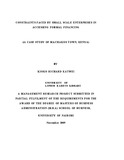| dc.description.abstract | Small-scale enterprises (SSE’s) are important in raising the economic efficiency of individuals hence of a country since they are the breeding grounds for entrepreneurship, innovations and inventions. This in return creates employment thus yields income which in turn reduces poverty level of a country. In Kenya the SSE’s have not grown to a notable impact often citing lack of credit.
The Kenyan financial system is a dual structure. It is characterized by existence of formal and informal financial markets. The formal sector is the supplier of credit and it makes up in part for lack of formal financing. This raises the issue of what determines whether the formal financial institutions would advance credit to SSE’s. The main objective of the study was to investigate the constraints faced by SSE’s in accessing formal credit and the awareness of financing from the formal sources. The study also identified the sources of finance used by the SSE’s in Machakos town and how the different sources vary with the size of the enterprise.
The study is intended to be of help to individual entrepreneurs, banks, micro-finance organizations, the government and other researchers.
Stratified random sampling was used where a sample of 100 was drawn from the population. The different sectors of the SSE’s in Machakos town that is trade and service were used as stratum. Data was gathered using questionnaires and analyzed with the help of statistical package for social sciences (SPSS).Descriptive statistics such as percentages and cross tabulations were used. Based on the survey findings data, descriptive statistics were provided as well as conditions of the findings and recommendations. Survey results revealed that institutional credit to SSE’s has not been substantially used despite strong interest for credit. Interest rates, collateral requirement, cumbersome documentation and time involved were identified as factors constraining access to formal credit.
Recommendations made include the enactment of interest regulatory bill and credit institutions to provide more information as well as make regulations more flexible by allowing use of collateral substitutes for securing loans. | en |

